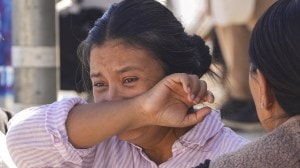Now it’s Uma vs Gehlot
WHEN Rajasthan chief minister Ashok Gehlot took off to Madhya Pradesh, it was certainly not for a holiday. He was there to counter the BJP ...

WHEN Rajasthan chief minister Ashok Gehlot took off to Madhya Pradesh, it was certainly not for a holiday. He was there to counter the BJP hold on the OBC votebank.
In the course of a whirlwind two-day tour of the state, Gehlot addressed a meeting of his own Mali-Saini caste in Indore, and OBC meetings in Mandsaur, Sheopur, Gwalior and Jabalpur. This thrust on the OBCs, on the eve of Home Minister L K Advani’s trip to MP to counter Digvijay’s Dalit agenda, has much to do with the caste configuration in the state.
In MP, the OBC vote comprises 52 to 54 per cent of the total electorate, according to chairman of the Backwards Classes Commission Sardar Singh Dangus. In contrast, the tribal vote percentage is 20 and the Dalit 16. But while the SC and ST votes are concentrated in various pockets — roughly the upper and lower halves of the state respectively — the OBC vote is spread over the state and is divided among various castes such as Lodhis, Kurmis and Yadavs, which find no reason to make common cause.
The BJP itself has been banking on this OBC card. Uma Bharti is herself a Lodhi, an important factor in ensuring she leads the party campaign, and BJP leader of opposition Babulal Gaur is a Yadav. Commenting on Gehlot’s visit, Gaur says, ‘‘Hindu society is organised on the basis of caste and one cannot run away from this fact. Casteism enters into any election campaign. The OBCs are underrepresented and whichever party tries to rectify this will gain.’’
He also is well aware that the various OBC castes are keen on their own representatives rather than general OBC candidate. ‘‘This must be rectified by putting up candidates from the Kurmis, Yadavs and Lodhis in proportion to their numbers. The BJP, of course, should have an advantage due to Uma Bharti. Several (BJP) leaders such as myself are also from among the OBCs.’’
But while Gaur has his own reasons for stressing the point, the Indian electoral system does not rely on proportional representation. The even spread of OBCs across the state means that their clout is less in comparison to communities concentrated in pockets. It is this factor that Digvijay is seeking to exploit. Given that the antagonism in recent Indian politics has almost always seen OBCs and Dalits on opposite sides of the political divide, Digvijay — in view of his very overt Dalit agenda — is seeking to focus on specific OBC castes while simultaneously emphasising that the BJP is not looking after OBC interests. In fact, the one point that Divijay and Gehlot both repeatedly stressed in their speeches was the Centre’s failure to amend the Constitution to allow 27 per cent reservation for OBCs in the state.
What Digvijay Singh said in Indore — and repeated in much of the state — sought to pin the blame on the Centre for failing to address the interests of the OBCs. ‘‘A Supreme Court ruling makes it impossible for reservation to exceed 50 per cent unless the Constitution is amended as was done under the Narasimha Rao government for Tamil Nadu. In MP, OBCs were awarded 14 per cent reservation in 1993 and the state Cabinet passed a resolution raising this to 27 per cent. This was sent to the Centre, which sat on it for five years before getting back to us in 2001 and refusing to make the changes. We have, however, written back to them saying why, if the amendment can be made for Tamil Nadu, is this not possible for MP? I do not have much hopes from this government, for reasons you well know but we will continue to argue our case till we raise the limit to 27 per cent.’’
And in the course of Gehlot’s tour through the state, his role, as an OBC himself, was to put the stamp of authenticity on the Digvijay government’s boasts. Time and again he spoke of how Digvijay had worked to ensure the welfare of the OBCs.





- 01
- 02
- 03
- 04
- 05


























